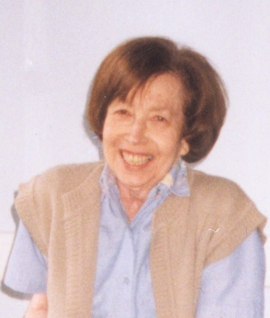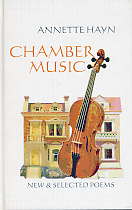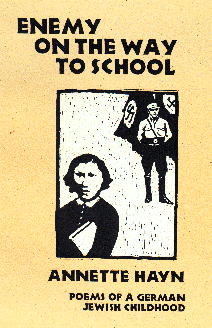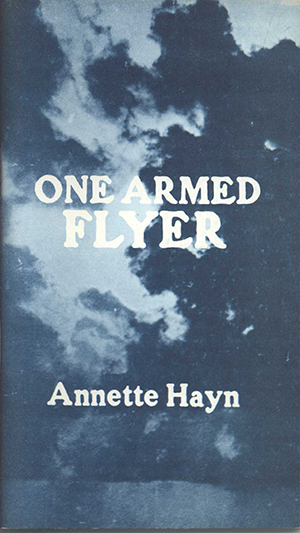
From a childhood in Nazi Germany to life among
modernist/surrealist poets in New York
...
One Armed Flyer. From The Poet's Press archive. This 1976 chapbook was Annette Hayn's second published book of poetry. It was written in memory of her husband, Gerald A. Hayn. In the introduction, Toby Olson writes: "In the poems in One Armed Flyer, Annette Hayn speaks of a world in which loss is central. It is a world that extends only so far as her own life extends, but it is rendered universal through the clarity of the poet's vision.
"The central force of these poems lies in their quiet attempt to understand and express the changes that loss causes. The result is a book of poems, painful, touching, and exact, that speaks to a basic human need."
We present here the book's central group of poems, a cycle called "Three Seasons," plus a reconsideration of the temptress "Delilah" and a surrealistic doll house occupied by famous poets.
DELILAH
1
Delila at thirteen
danced through the moonlit desert
next to her camel
2
was cast as Samson's mistress
to betray him
3
She didn't want to hear
the secret, argued with him
not to tell
My mother saw an angel once —
Let's not talk politics.
She used to like to braid
his hair shone in the sun.
4
It's all a matter
of whose side you're on.
There are no villains.
When Judith took a lover she cut off his head
is still applauded for it
but Delilah —
5
attracted to the challenge
a breathlessness
she wished —
despite the foxes
tied tail to tail
with firewood between them —
to be his wife.
6
So here she was —
Samson away on business —
alone a lot in the hot tent
despised the Philistine lords
kept pestering her
especially Lakashka
the chief of spies.
7
She talked in her sleep
.8
Then came
his sudden helplessness (a lack
of confidence can do that)
There was an angel
somewhere and a god
Delilah couldn't see them.
9
Many deaths.
She died
when his eyes died.
For him it became
another way of seeing
her
.10
It was the Philistinian lord who gave the orders.
It was after all her guilt.
It was the wind
listening.
It was after he was blinded, he began
to noticeDelilah stumbling through the shadows
or words and stones
eyelashes without eyes for generations
11
Delilah forced to dance
among the priestesses
for Dagon, the god of war.
Samson was led in by the angel
in the form of a small boy
The pillar, Samson, lean against the pillar.
The temple fell on top of them
and many others.
12
The stage is dark. Delilah
are you there?
13
Temples are what we erect
for ourselves.
Samson and Delilah
(that sounds nice)
Samson and Delilah at the foot
of their templebetween the telling of the secret
and the cutting of the hairfor that hour.
UNLIKELY MARRIAGE
In the dusty dollhouse
John Ashbery and Emily Dickinson
man and wife
have been asleep for years
with their six children
(one is lost)
that won't grow up
assorted dogs and cats
a wooden mouse and artificial flowers
In their colonial bed
turned to each other
they look uncomfortable.
Picasso prints are pasted on the walls.
(The real John Ashbery
with a mustache
may not like
Dickinson's life style;
but here they are.
They have no choice)
After an interlude
of climbing ladders and being hugged
they wait
he in a flannel suit
she with long hair
their arms outstretchedfor the next generation.
A glass of plastic beer
on the red kitchen table
and manuscripts.
HALF WAY
Who am I angry atwhen I wake up
to an empty sky?
October used to bemy favorite month
unpredictable red
and windy.
Now I do things half way.tired
of being saved
be everyone;
the Christian Science
carpet man
with orange sneakers on
That little oak we planted
last to turn color
I am reluctantto get up today
can't make our bed
(shadows are everywhere)
the cat sleeps on it
THREE SEASONS
1
TEMPORARY
Drops
on the window pane
and moist green leaves
but it's
October, a hurricane
further south; wind
blows the weekly
radio program
to the floor. On my lap
our illegal
kitten purrs. We
have not been
evicted yet.
2
THE VERDICT
He cuts a window in your chest
looks inwhile in a waiting room
the walls are white.
Only the clock moves.
A girl relaxes, reads a magazine
all others look afraid.
A woman seems familiar
another claims to know me
wears a wig.
One by one
they disappear into adjoining rooms.
The relaxed girl screams.
Three smiling secretaries
go to lunch. I keep running
to the bathroom.
At last your doctor comes:
We'll have to waitand you lie there
near a closed window.
3
AFTER
Sparrows carry on
as usual
as if the storm had never happened
nor your illness
but the oak is floundering
without supports.
Instead of holding it up
two pillars, half broken
lean against it
heavily.No one to pull them out
or hammer them back in.
No one to cut the wire.
4
GET WELL
The city at your feet through a hospital window
how white everything is
to go to sleep ingive me a pencil and a lamp
live in this fairy taleI carry
a Catholic medal
good luck charm.
We need all the help we can get.
5
IN THE SAME ROOM
Most flowers
die
I water them
and feed you ice cream
twice a day
to get you well
in the same room
for you to see
yellow chrysanthemums
and make you smile
in a white pot
in earth
your skin is peeling
on the water mattress
you cannot walk
need oxygen
grow thin and fretful
die
while yellow
in full bloom
chrysanthemums — —
6
TO BE CONTINUED
The scenery keeps changing
all night long;
they're only dreams.
How pleasant
not to take things
seriously.but in the morning
beds are closed.
I am no longer safe.Time now
to face the mirror
while tree trunks stay the same
and mailmen come.
7
A WINDY DAY
A new apartment
cemetery plot
and nursing home,
a yellow sign.
My mother walks inside
trusting me
for the last time.
At the cemetery plot
yellow-skinned
with your best tie
in a wooden box
I'm glad for
yellow flowers. Wind
blows them over
during the prayer
we're in the midst
of wedding plans again.
They take out
stock certificates
to pay for this
playing Monopoly
on the living room floor
the wedding guests
have been invited late
because of the funeral
she refuses to eat
tugs furiously
at her restraints
you died
I'll be alone
at our daughter's wedding
in a yellow gown.
To buy this poet's books...
EXPANDED SECOND EDITION OF ANNETTE HAYN'S NEW AND SELECTED POEMS.
 Chamber Music was first published in September 2001, and was Annette Hayn's last book. She died in September, 2004. The book was re-issued by The Poet's Press in Spring 2009 with new material: the poet's last, posthumous poems (Memorial to the Moon) and a memoir by poet Mary Ferrari. This 152-page book brings together the poet's best mature work, plus her own selections of the best poems from her earlier books, Rapunzel (1971), One-Armed Flyer (1976), Journeys Around One Point (1980), The Crossing (1984), Calendar House (1990), and Enemy on the Way to School (1994). Annette believed that Chamber Music in 2001 would be her last book, but the final group of poems added for this edition demonstrate that she was still in peak form. This finely-etched, spare poetry, influenced greatly by the example of her early teacher, Kenneth Koch, intersperses the everyday with the surrealistic, walks bravely among her worlds: childhood in Nazi Germany, boarding school in England, family life and the discovery of poetry writing in America, and her final years overshadowed by 9/11 and her own confrontation with mortality.
Chamber Music was first published in September 2001, and was Annette Hayn's last book. She died in September, 2004. The book was re-issued by The Poet's Press in Spring 2009 with new material: the poet's last, posthumous poems (Memorial to the Moon) and a memoir by poet Mary Ferrari. This 152-page book brings together the poet's best mature work, plus her own selections of the best poems from her earlier books, Rapunzel (1971), One-Armed Flyer (1976), Journeys Around One Point (1980), The Crossing (1984), Calendar House (1990), and Enemy on the Way to School (1994). Annette believed that Chamber Music in 2001 would be her last book, but the final group of poems added for this edition demonstrate that she was still in peak form. This finely-etched, spare poetry, influenced greatly by the example of her early teacher, Kenneth Koch, intersperses the everyday with the surrealistic, walks bravely among her worlds: childhood in Nazi Germany, boarding school in England, family life and the discovery of poetry writing in America, and her final years overshadowed by 9/11 and her own confrontation with mortality.
ISBN 0-922558-37-X, paperback, 152 pp., $14,95.
Buy PDF Ebook Now

Enemy On The Way to School. New second printing for 2016. Poems of
a German Jewish childhood in the 1930s. Set against the background
of the rising Nazi menace, these poems leave an indelible impression
of a lost world, and the eternal alienation felt by those who
left it behind. With an introduction by poet Mary Ferrari. ISBN 0-922558-21-3. Paperback $9.95. CLICK BELOW TO ORDER FROM AMAZON.
Buy PDf Ebook Now
ANNETTE HAYN. ONE ARMED FLYER.
 This chapbook was first published by The Poet's Press Books in 1976. Although framed as a personal book — an elegy for her late husband Gerald Hayn — it is the work of an experienced poet who worked in miniature, with restraint and pinpoint language. The foreword by Toby Olson summed up why this book was worth publishing, and still worth reading:
This chapbook was first published by The Poet's Press Books in 1976. Although framed as a personal book — an elegy for her late husband Gerald Hayn — it is the work of an experienced poet who worked in miniature, with restraint and pinpoint language. The foreword by Toby Olson summed up why this book was worth publishing, and still worth reading:
"Our people have a variety of ways of leaving us. Our children grow up, our parents age, loved ones die. But in an ironic and certainly poignant sense, the presence of those lost grows stronger in their absence. This is because the fact of their passing changes our total feel for things, and their fixed presence seldom does that. In the poems in One Armed Flyer, Annette Hayn speaks of a world in which loss is central. It is a world that extends only so far as her own life extends, but it is rendered universal through the clarity of the poet's vision. The central force of these poems lies in their quiet attempt to understand and express the changes that loss causes. The result is a book of poems, painful, touching, and exact, that speaks to a basic human need. For the readers of Annette Hayn's poems, loss is a kind of gain."
The book is not monothematic, since the poet has included some fine poems that stand on their own, such as her portrait of the biblical Delilah, and the delightful fantasy, "Unlikely Marriage" in which John Ashbery and Emilie Dickinson set up housekeeping in a doll house.
With the release of this ebook facsimile, The Poet's Press continues the republication of the best books from our archives.
The 218th publication of The Poet's Press. PDF, 4 x 7" , 64 pages. To download and read this FREE Ebook, CLICK HERE.
ANNETTE HAYN. JOURNEYS AROUND ONE POINT.
 This chapbook was first published under The Poet's Press Grim Reaper Books imprint in 1980. The foreword by Mary Ferrari provides special perspective on Annette Hayn's work.
This chapbook was first published under The Poet's Press Grim Reaper Books imprint in 1980. The foreword by Mary Ferrari provides special perspective on Annette Hayn's work.
"Annette Hayn 's poems are composed of several disparately colored threads tied peculiarly together; several streaks of light running through a few lines as quickly and intently as a cat, through
leaves.
She is a poet of both the fantastic far away and the realistic near. She gives us images from a childhood lived within the shadow of a mountain-climbing mother and Hitler's Germany. Her contemporary views are no less exciting; have always about them a hint of theatre. Her sometimes stormy patches of domesticated nature go a
long way emotionally; and are reminiscent of Emily Dickinson.
Each poem is an oblique glimpse through a small intensely lighted window. One looks in a window at the apparently necessary destruction of "roses / a woman ... " Another looks out: " ... and now the mugger can be seen clearly —".
Hayn's poems are miniatures in watercolor; have need of almost no beginning or end; catch that balloon, that voice in flight; are truly "journeys around one point": Annette Hayn's powerful sensibility."
With the release of this ebook facsimile, The Poet's Press continues the republication of the best books from our archives.
The 219th publication of The Poet's Press. PDF, 4 x 7" , 64 pages. To download and read this FREE Ebook, CLICK HERE.
08/04/2017
 Chamber Music was first published in September 2001, and was Annette Hayn's last book. She died in September, 2004. The book was re-issued by The Poet's Press in Spring 2009 with new material: the poet's last, posthumous poems (Memorial to the Moon) and a memoir by poet Mary Ferrari. This 152-page book brings together the poet's best mature work, plus her own selections of the best poems from her earlier books, Rapunzel (1971), One-Armed Flyer (1976), Journeys Around One Point (1980), The Crossing (1984), Calendar House (1990), and Enemy on the Way to School (1994). Annette believed that Chamber Music in 2001 would be her last book, but the final group of poems added for this edition demonstrate that she was still in peak form. This finely-etched, spare poetry, influenced greatly by the example of her early teacher, Kenneth Koch, intersperses the everyday with the surrealistic, walks bravely among her worlds: childhood in Nazi Germany, boarding school in England, family life and the discovery of poetry writing in America, and her final years overshadowed by 9/11 and her own confrontation with mortality.
Chamber Music was first published in September 2001, and was Annette Hayn's last book. She died in September, 2004. The book was re-issued by The Poet's Press in Spring 2009 with new material: the poet's last, posthumous poems (Memorial to the Moon) and a memoir by poet Mary Ferrari. This 152-page book brings together the poet's best mature work, plus her own selections of the best poems from her earlier books, Rapunzel (1971), One-Armed Flyer (1976), Journeys Around One Point (1980), The Crossing (1984), Calendar House (1990), and Enemy on the Way to School (1994). Annette believed that Chamber Music in 2001 would be her last book, but the final group of poems added for this edition demonstrate that she was still in peak form. This finely-etched, spare poetry, influenced greatly by the example of her early teacher, Kenneth Koch, intersperses the everyday with the surrealistic, walks bravely among her worlds: childhood in Nazi Germany, boarding school in England, family life and the discovery of poetry writing in America, and her final years overshadowed by 9/11 and her own confrontation with mortality. 
 This chapbook was first published by The Poet's Press Books in 1976. Although framed as a personal book — an elegy for her late husband Gerald Hayn — it is the work of an experienced poet who worked in miniature, with restraint and pinpoint language. The foreword by Toby Olson summed up why this book was worth publishing, and still worth reading:
This chapbook was first published by The Poet's Press Books in 1976. Although framed as a personal book — an elegy for her late husband Gerald Hayn — it is the work of an experienced poet who worked in miniature, with restraint and pinpoint language. The foreword by Toby Olson summed up why this book was worth publishing, and still worth reading:  This chapbook was first published under The Poet's Press Grim Reaper Books imprint in 1980. The foreword by Mary Ferrari provides special perspective on Annette Hayn's work.
This chapbook was first published under The Poet's Press Grim Reaper Books imprint in 1980. The foreword by Mary Ferrari provides special perspective on Annette Hayn's work. 
